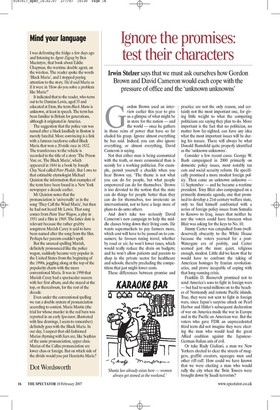Mind your language
I was defrosting the fridge a few days ago and listening to Agent Zigzag by Ben Macintyre, that book about Eddie Chapman, the wartime double agent, on the wireless. The reader spoke the words 'Black Maria', and I stopped paying attention to the story. He'd said Maria as if it were in 'How do you solve a problem like Maria?'
It indicated that to the reader, who turns out to be Damian Lewis, aged 35 and educated at Eton, the term Black Maria is unknown, at least in speech. The term has been familiar in Britain for generations, although it originated in America.
The suggestion that the police van was named after a black landlady in Boston is merely fanciful. More convincing is a link with a famous racehorse called Black Maria that won a 20-mile race in 1832. The transference to the vehicle is recorded in the title of a story 'The Prison Van; or, The Black Maria', which appeared in 1844 in a book by Joseph Clay Neal called Peter Ploddy. But I owe to that estimable etymologist Michael Quinion the information that examples of the term have been found in a New York newspaper a decade earlier.
Mr Quinion notes that the pronunciation is 'universally' as in the song 'They Call the Wind Maria', but then he had not heard Mr Lewis. That song comes from Paint Your Wagon, a play in 1951 and a film in 1969. The latter date is relevant because the rather grubby songstress Mariah Carey is said to have been named after the song from the film Perhaps her parents couldn't spell.
But the unusual spelling Mariah, definitely pronounced like the police wagon, suddenly became very popular in the United States from the beginning of the 1990s, joggling along at the top of the popularity charts with the more conventional Maria. It was in 1990 that Mariah Carey had a spectacular success with her first album, and she stayed at the top, or thereabouts, for the rest of the decade.
Even under the conventional spelling we run a double system of pronunciation according to context. Maria Martin (the trial for whose murder in the red barn was reported in an early Spectator, illustrated with line drawings, I seem to remember) definitely goes with the Black Maria. In our day, I suspect that old-fashioned Marias rhyming with liars are, like Sophias of the same pronunciation, upper class. Marias of the Callas pronunciation are lower class or foreign. But on which side of the divide would you put Henrietta Maria?













































 Previous page
Previous page